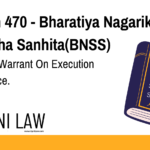1. Code: Exact Text of Section 475 BNSS
Notwithstanding anything contained in Section 473, where a sentence of imprisonment for life is imposed on conviction of a person for an offence for which death is one of the punishments provided by law, or where a sentence of death imposed on a person has been commuted under Section 474 into one of imprisonment for life, such person shall not be released from prison unless he had served at least fourteen years of imprisonment.
2. Explanation of Section 475 BNSS
Section 475 BNSS limits the power of remission or commutation in specific cases where:
- A person has been sentenced to life imprisonment for an offense that carries death as one of the possible punishments.
- A person originally sentenced to death has had their punishment commuted to life imprisonment under Section 474 BNSS.
In both cases, the convict must serve a minimum of 14 years in prison before being considered for release, ensuring that serious offenders do not get premature remission or commutation.
3. Illustration: Example of Application
✅ Example 1: Life Sentence for a Crime Punishable by Death
Arun is convicted of murder under Section 302 IPC, which carries either the death penalty or life imprisonment. The court sentences him to life imprisonment instead of death. Under Section 475 BNSS, he must serve at least 14 years before he can be considered for release.
✅ Example 2: Death Sentence Commuted to Life Imprisonment
Rahul is sentenced to death for a heinous crime. However, the President commutes his death penalty to life imprisonment under Article 72 of the Constitution. Since his death sentence was converted into life imprisonment under Section 474 BNSS, he cannot be released until he has served a minimum of 14 years in prison as per Section 475 BNSS.
4. Common Questions and Answers
✅ Q1: Can a convict sentenced to life imprisonment for a serious offense be released before 14 years?
No, if the crime was punishable by death or if a death sentence was commuted to life imprisonment, the convict must serve at least 14 years in prison before being considered for release.
✅ Q2: Can the President or Governor grant early release before 14 years?
While the President (under Article 72) and Governor (under Article 161) have the power to grant pardons, Section 475 BNSS imposes a statutory minimum imprisonment of 14 years. However, courts and constitutional authorities may still intervene in exceptional circumstances.
✅ Q3: How is this different from normal remission under Section 473 BNSS?
- Section 473 BNSS allows remission or suspension of any sentence by the government.
- Section 475 BNSS restricts remission in serious cases, ensuring that convicts serve at least 14 years before early release is considered.
✅ Q4: Does this section apply to all life sentences?
No, Section 475 BNSS applies only when:
- The crime was punishable by death, but the convict got life imprisonment instead.
- A death sentence was commuted to life imprisonment under Section 474 BNSS.
5. Conclusion
Section 475 BNSS prevents the misuse of remission and commutation in serious criminal cases by mandating that offenders serve at least 14 years in prison before any release is considered. This provision ensures that those convicted of heinous offenses do not receive premature leniency while maintaining a balance between justice and reformation.








